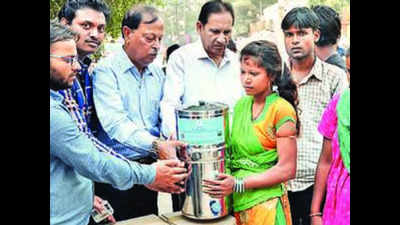- News
- City News
- patna News
- 250 filters distributed in slums to purify water in Patna
Trending
This story is from November 5, 2019
250 filters distributed in slums to purify water in Patna
People living in slum areas of the state capital and facing the problem of getting contaminated water for drinking may now hope to get some relief.

The National Environmental Engineering Research Institute (NEERI), Nagpur, has distributed specially designed 250 units of water filters with easy technique to kill microbial contamination in the slums
By: V K Tripathi
PATNA: People living in slum areas of the state capital and facing the problem of getting contaminated water for drinking may now hope to get some relief.
The National Environmental Engineering Research Institute (NEERI), Nagpur, has distributed specially designed 250 units of water filters with easy technique to kill microbial contamination in the slums which remained waterlogged for long after incessant rain in Patna in the last week of September.It posed the threat of contamination through leakage in the shallow aquifers of groundwater and that supplied by the government.
These water filters were provided to the Centre for Fluorosis Research (CFR) at A N college, a collaborating partner of NEERI, for distribution in such areas to help the unprivileged people who could not afford such facilities and depended on the supply water for all purposes, said Bihari Singh, project incharge of CFR.
NEERI scientists Abhi Mane and Swagat described the special features of these water filters and briefed the beneficiaries on their functioning.
CFR project supervisor Rajesh Kumar said each water filter has two jars — the upper one of seven litres capacity and the lower one with 10 litres fitted with a water tap. The upper jar has sand bags in which two drops of a chemical— sodium hypochlorite — would be mixed to kill microorganisms of 10 litres of contaminated water. He said each beneficiary would be supplied with six bottles of the chemical for one year. In case of any difficulty in handling the filters, the CFR team members would come to help.
“Prolonged waterlogging increased the chances of water contamination with microorganisms like bacteria and protozoan, the important sources of various waterborne diseases and these filters would thus help residents get pure drinking water,” said Kumar, adding that water samples from these areas were also being collected for test in the CFR lab. Research associates Prashant Chandra, Vishal Patel and Palas Kumar Dutta and students of PG department of chemistry at AN College were also involved in the water filters distribution.
PATNA: People living in slum areas of the state capital and facing the problem of getting contaminated water for drinking may now hope to get some relief.
The National Environmental Engineering Research Institute (NEERI), Nagpur, has distributed specially designed 250 units of water filters with easy technique to kill microbial contamination in the slums which remained waterlogged for long after incessant rain in Patna in the last week of September.It posed the threat of contamination through leakage in the shallow aquifers of groundwater and that supplied by the government.
These water filters were provided to the Centre for Fluorosis Research (CFR) at A N college, a collaborating partner of NEERI, for distribution in such areas to help the unprivileged people who could not afford such facilities and depended on the supply water for all purposes, said Bihari Singh, project incharge of CFR.
On Monday, a team of NEERI-CFR visited two slum areas near Budh Murti in Kadamkuan and Jhuggi Jhopri slum area near Rajendra Nagar Shakha Maidan and distributed water filters by ascertaining the beneficiaries through their Aadhaar cards. The officials also demonstrated the filters’ functioning. He said the slum areas at Kajipur and Doctors Colony in Kankarbagh have also been identified for distribution of water filters.
NEERI scientists Abhi Mane and Swagat described the special features of these water filters and briefed the beneficiaries on their functioning.
CFR project supervisor Rajesh Kumar said each water filter has two jars — the upper one of seven litres capacity and the lower one with 10 litres fitted with a water tap. The upper jar has sand bags in which two drops of a chemical— sodium hypochlorite — would be mixed to kill microorganisms of 10 litres of contaminated water. He said each beneficiary would be supplied with six bottles of the chemical for one year. In case of any difficulty in handling the filters, the CFR team members would come to help.
“Prolonged waterlogging increased the chances of water contamination with microorganisms like bacteria and protozoan, the important sources of various waterborne diseases and these filters would thus help residents get pure drinking water,” said Kumar, adding that water samples from these areas were also being collected for test in the CFR lab. Research associates Prashant Chandra, Vishal Patel and Palas Kumar Dutta and students of PG department of chemistry at AN College were also involved in the water filters distribution.
End of Article
FOLLOW US ON SOCIAL MEDIA










